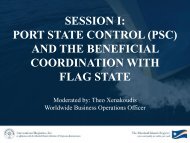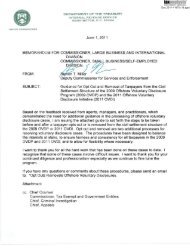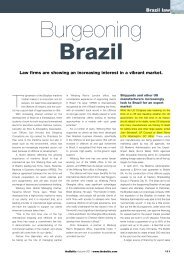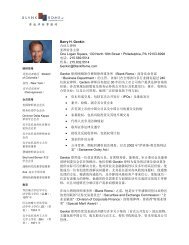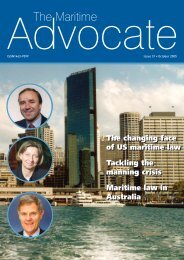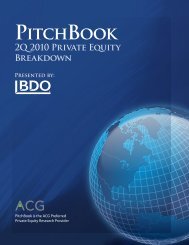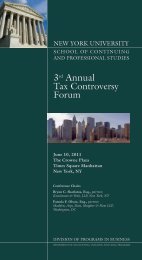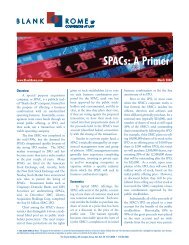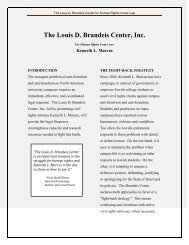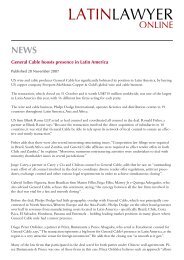From Enron To Lehman Brothers - aacmi
From Enron To Lehman Brothers - aacmi
From Enron To Lehman Brothers - aacmi
You also want an ePaper? Increase the reach of your titles
YUMPU automatically turns print PDFs into web optimized ePapers that Google loves.
• The motivations and personality of the whistleblower are not<br />
relevant to the truth of the allegations. Whistleblowers with<br />
difficult personalities or who have obviously ulterior motives<br />
may receive short shrift in any investigation, even though<br />
their complaints may be valid. SEC officials made this mistake<br />
in ignoring Harry Markopolos’ revelations about Bernie<br />
Madoff approximately 10 years before his Ponzi scheme was<br />
revealed. 16<br />
• Periodically assess the effectiveness of any employee hotline<br />
and provide employee compliance training.<br />
• Independent counsel should report to the whistleblower or<br />
his or her attorney the status and results of the investigation<br />
and the organization should provide annual reports to all<br />
employees as to actions taken.<br />
• Legitimate employee whistleblowers should receive meaningful<br />
monetary rewards.<br />
• The whistleblower policy must be communicated effectively.<br />
• Milder sanctions should be considered for whistleblowers<br />
involved in illegal group activity.<br />
• Retaliation claims should be independently investigated.<br />
• The director of corporate compliance (if any) should report<br />
to the independent directors and become their eyes and ears<br />
within the organization.<br />
• The tone at the top of the organization must support an<br />
ethical, law-abiding culture. The tone at the top should be<br />
established not only by the CEO and CFO, but also by the<br />
audit committee chair.<br />
A key factor in employee willingness to use hotlines is the<br />
communication of the results of investigations of hotline<br />
tips and the actions taken. 17 Many companies do not adequately<br />
communicate this information to the whistleblower.<br />
16 “Investigation of Failure of the SEC to Uncover Bernard Madoff’s<br />
Ponzi Scheme—Public Version,” U.S. Securities and Exchange<br />
Commission, Office of Investigations, Report No. OIG-509, August<br />
2009, p. 250 (www.sec.gov/news/studies/2009/oig-509.pdf). See<br />
also Harry Markopolos, No One Would Listen (Hoboken, NJ: John Wiley<br />
& Sons, 2010).<br />
17 Ibid.<br />
Conclusion and Action Items<br />
In summary, most current SOX whistleblower systems are<br />
not sufficiently robust to attract potential internal whistleblowers,<br />
particularly executive whistleblowers. Internal<br />
compliance systems do not have to compete monetarily<br />
with available statutory awards since most potential internal<br />
whistleblowers prefer not to suffer the disincentives of going<br />
public with their information, including waiting many years<br />
for any bounties from litigation. However, it is necessary for<br />
the SOX whistleblower systems to provide sufficient incentives<br />
to potential internal whistleblowers to induce them to provide<br />
to the audit committee the information necessary to correct<br />
law violations and to reveal significant risk exposures.<br />
The following are recommended action items for audit<br />
committees:<br />
• Audit committees should reexamine their whistleblower<br />
and compliance policies to make certain that they encourage<br />
reporting of major enterprise risk exposures, fraud, and other<br />
illegal activity.<br />
• Accounting, auditing, or enterprise risk complaints should<br />
be sent by the hotline service directly to the audit committee<br />
chair or his or her designee (such as completely independent<br />
counsel or other ombudsman). Completely independent<br />
counsel refers to a law firm selected by the audit committee<br />
that does not receive any significant legal fees from<br />
management.<br />
• Whistleblower complaints or retaliation complaints from<br />
whistleblowers (excluding routine employment-related<br />
complaints) should be investigated by completely independent<br />
counsel who has forensic capabilities, preferably from<br />
a law enforcement background.<br />
• Employees (particularly executives) should be permitted to<br />
hide their identity by using their personal attorney, forming<br />
an entity, or a combination of both, with the company reimbursing<br />
the costs incurred if the information is legitimate.<br />
• Meaningful rewards should be created for employee whistleblowers<br />
if the information is legitimate. A meaningful reward<br />
might include an amount equal to the yearly compensation of<br />
the employee or a percentage of the savings of the company.<br />
However, the audit committee would retain complete discretion<br />
of the amount of the reward.<br />
6 Director Notes <strong>From</strong> <strong>Enron</strong> <strong>To</strong> <strong>Lehman</strong> <strong>Brothers</strong><br />
www.conferenceboard.org



